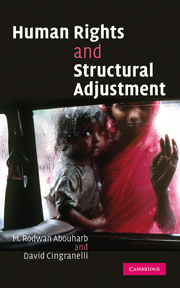5 - Determinants of structural adjustment lending
Published online by Cambridge University Press: 30 June 2009
Summary
Introduction
In 1982 the Republican administration of Ronald Reagan voiced concern over the state of emergency decreed by the Chilean military government of Augusto Pinochet and the increased levels of human rights abuses that were taking place. The administration threatened to direct its representative to the IMF to vote against the award of structural adjustment packages unless the Pinochet regime lifted its state of emergency and improved its record of respect for human rights. Three years later the Reagan administration also abstained in its support for World Bank and IMF loans to Chile for several months until the regime lifted its state of siege (Coad 1985; Omang 1985). Apparently the administration was concerned over the levels of human rights abuses taking place; most attention had been paid to the opposition press censorship (Coad 1985).
This example provides an intriguing contrast to the founding charter of both the World Bank and International Monetary Fund, which excludes political considerations in the loan-agreement process of these institutions. When decisions are being made about the allocation, amount, and conditions under which resources are apportioned, the idea that only economic factors affect the evaluation of member countries' representatives to these decision-making boards, is, at best, wishful thinking: politics inevitably becomes involved. In our historical assessment of how these institutions came to make their decisions over the 1981–2003 period, we built upon the existing literature that identified significant factors affecting the decisions of these institutions to enter into structural adjustment agreements with developing countries.
- Type
- Chapter
- Information
- Human Rights and Structural Adjustment , pp. 105 - 132Publisher: Cambridge University PressPrint publication year: 2007



